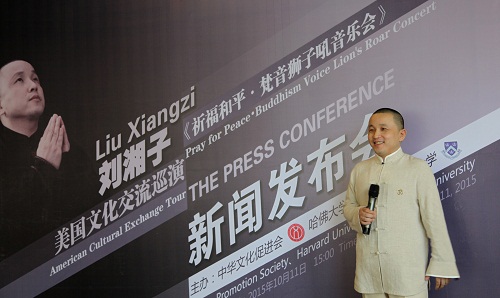《祈福和平•梵音獅吼音樂會》即將登陸美國
發佈時間: 2015-09-28 11:26:50 | 來源: 中國網 | | 責任編輯: 任曼瑤

中國知名梵唄創作音樂家劉湘子將於2015年10月11日將在美國紐約Merkin Concert Hall舉辦《祈福和平•梵音獅吼音樂會》。據悉,這是東方梵唄音樂中“獅子吼”傳承人首次至美舉辦專場音樂會,並進行相關梵唄音樂文化交流活動。
Liu Xiangzai, Chinese well-knownBuddhist Chanting creative musician, is going to hold thePray for Peace•Buddhism Voice Lion's RoarConcert at Merkin Concert Hall r in New York, America on October 11, 2015. It is reported that it will be the first time for the inheritor of the lion's roar of the orientalBuddhist Chanting to hold a special concert in America, and participate in the relativeBuddhist Chantingmusic cultural exchange activities at the same time.
“梵唄”,在始於東方古印度,在佛教傳承中有數千年的歷史,至今在印度瑜伽和藏傳佛教、甚至漢傳佛教中,被視為利用音聲開啟覺性的一種修行法門。“梵”,為古印度音譯詞“梵摩”或“梵覽摩”(音)一詞的縮略,義為“清凈、寂靜”;“唄”為“唄匿”的略稱,義為“讚頌、歌咏”。梵唄音樂,具備迥異於世俗音樂的音律、唱誦形制,甚至講究呼吸節奏與身體氣脈的連結,近年來被視為一種古老獨特的文化傳承而逐漸引起世界範圍的關注。
Buddhist Chantingoriginated in eastern ancient India, with thousands of years of historyin the Buddhist tradition. It has been regarded as a kind of practice method using sound to open the awareness in the Indian yoga and Tibetan Buddhism, and even in Chinese Buddhism until now. "Sanskrit", the abbreviation of the transliterated word"Brahma" or "Vatican " (sound)in the ancient India, which means "quietness" or "silence"; "Chanting" is the abbreviation of the Pathaka, which means "praise" or "singing". Its rhythm and chanting form are different from the secular music, and even focus on the connection of the breathing rhythm and the body channels. In recent years, it has been taken as an ancient and unique cultural heritage and gradually attracted worldwide attention.
據悉,劉湘子,中國知名梵唄創作音樂家,“獅子吼”唱法傳承者,梵唄音樂的傳播者和推廣者。他創造性地把梵唄與現代音樂結合起來,把幾近失傳的“獅子吼”技法和梵文佛教經咒完美地融入到音樂創作中,十幾年間共創作梵唄音樂60余首,廣為傳唱。其代表作品有《百字明》、《金剛薩埵》、《蓮師心咒》、《心經》、《觀音十法》等。
By report,Liu Xiangzi is Chinese famous Buddhist Chanting creative musician, the successor of Lion's roar singing, as well as the communicator and promoter of Buddhist Chanting. He combines Buddhist Chanting with modern music, and integrates the nearly lost Lion's roar singing into music creatively. During the last couple of years, he had written more than 60 pieces of Buddhist Chanting music, which have been spread widely. His representative works include Hundred-Syllable Mantra of Vajrasattva, Dorje Sempa, Heart Mantra of Guru Rinpoche, TheHeart Sutraand Guan Yin Dasadhamma.
作為“獅子吼”唱法的傳承者,劉湘子以梵唄文化普及者的身份,通過演出、禪修和文化講座等多種方式傳播梵唄音樂和“獅子吼”這一幾近失傳的曠世絕學。廣開音聲法門,以歡喜心歌唄佛法,以菩提心開啟智慧。
As the inheritor of Lion's roar singing, Liu Xiangzi, the popularize of Buddhist Chanting culture, spreads Buddhist Chanting music and the nearly lost Lion's roar singing technique via performances, meditation and cultural lectures and other means. He opens up the sound method, singing Buddha dharma with a joyful heart and opening the wisdom of Buddhism with bodhicitta.
劉湘子梵唄音樂的魅力,在於他的梵唱能讓聽者從心底深處喚出真實信心的力量,找到我們的本心。
What the most intriguing of his Buddhist Chanting lies in that it could arouse the true power of faith of listeners from the bottom of their heart, and find our original mind.
在古老東方的神話中,“獅子吼”(Lion's roar)是開創宇宙的原音,是覺醒和解脫的終極依據。獅子吼,是萬物惟一的宇宙觀,是氣脈無礙的修行力,是利益眾生的菩提心。劉湘子梵音音樂會,讓我們領略這種東方曠世絕學的獨特魅力,打開天人合一的音聲法門。
In the ancient oriental mythology, Lion's roar is the original sound of creating the universe, and the ultimate basis for awakening and liberation. It is the only cosmology in the universe, the spiritual force of the unhindered channels, and the bodhicittaforbenefiting sentient beings. Let’s enjoy the unique charm of this orientalmasterpiece and open the anthropocosmic sound method in Liu Xiangzi Buddhist concert.
自2013年,劉湘子以梵唄文化傳播者身份,通過演出、講座等形式為東方梵唄文化的傳播與推廣作出了不懈努力。2014年,劉湘子在北京工人體育館、北京中山音樂堂、北京八大處等地作為主演,舉辦了《吉祥中國音樂會》、《觀•音心靈音樂會》等一系列梵唄音樂演出,在梵唄音樂界中盛名遠揚。
Since 2013 ,Liu Xiangzi has made unremitting efforts in the communication &promotion of orientalBuddhist Chanting culture through performances, lectures and other forms as the disseminator of Buddhist Chanting culture. In 2014, he, as the starring, held a series ofBuddhist Chantingmusical performances such as Auspicious Chinese Concertand Guanyin Heart Concert at the Beijing Workers' Gymnasium, Beijing Forbidden City Concert Hall, and Beijing Badachu Parketc., which was very famous in Buddhist Chanting music field.
據此次美國《祈福和平•梵音獅吼音樂會》的相關負責人介紹,此次音樂會由中華文化促進會、哈佛大學、哥倫比亞大學聯合主辦,並將由樂視音樂進行全球直播,這是東方梵唄中“獅子吼”傳承人首次至美舉辦專場音樂會,並進行相關梵唄音樂文化交流活動。
According to the introduction of the relevant responsible person of Pray for Peace•Buddhism Voice Lion's RoarConcert in the US, the concert will be co-sponsored by Chinese Culture Promotion Association, Harvard University, and Columbia University, and will be broadcast live worldwide by LETV Music.It will be the first time for the inheritor of the lion's roar of the orientalBuddhist Chanting to hold a special concert in America, and participate in the relativeBuddhist Chantingmusic cultural exchange activities at the same time.
除2015年10月11日在美國紐約Merkin Concert Hall舉辦《祈福和平•梵音獅吼音樂會》外,劉湘子還將提前10月7日在美國波士頓的哈佛大學進行一場題為《‘獅子吼’——來自東方的密音與傳承》的專題演講。音樂會後,在10月09日于美國紐約哥倫比亞大學,劉湘子還將主持一場主題為《音聲法門——啟動氣脈與悟性》的專題研討會,以期增進西方對東方梵唄音樂文化的認識與交流。
Except for the Pray for Peace•Buddhism Voice Lion's RoarConcert held at Merkin Concert Hall in New York on October 11, 2015, Liu Xiangzi will deliver a keynote speech Lion's Roar—the Secret Sound and Heritage from the Eastat Harvard University in Boston, America on October 7 in advance. After the concert, he will hold a symposium about Voice Method—Start Nadis and Comprehension at Columbia University in New York, America on October 09, so as to promote the Western understanding and exchanges of Buddhist Chanting musical culture about the East.
| 責任編輯: 任曼瑤 |


